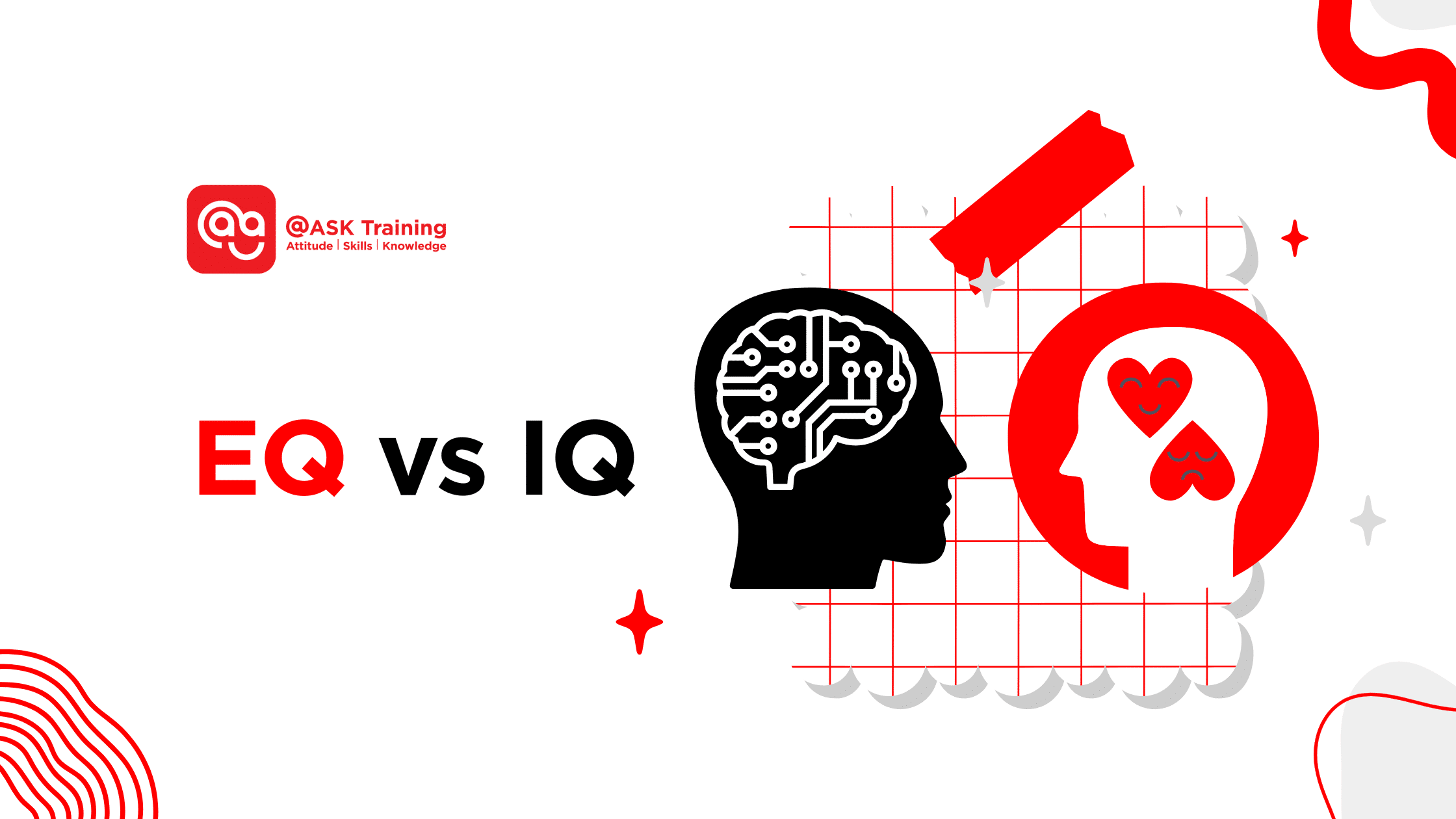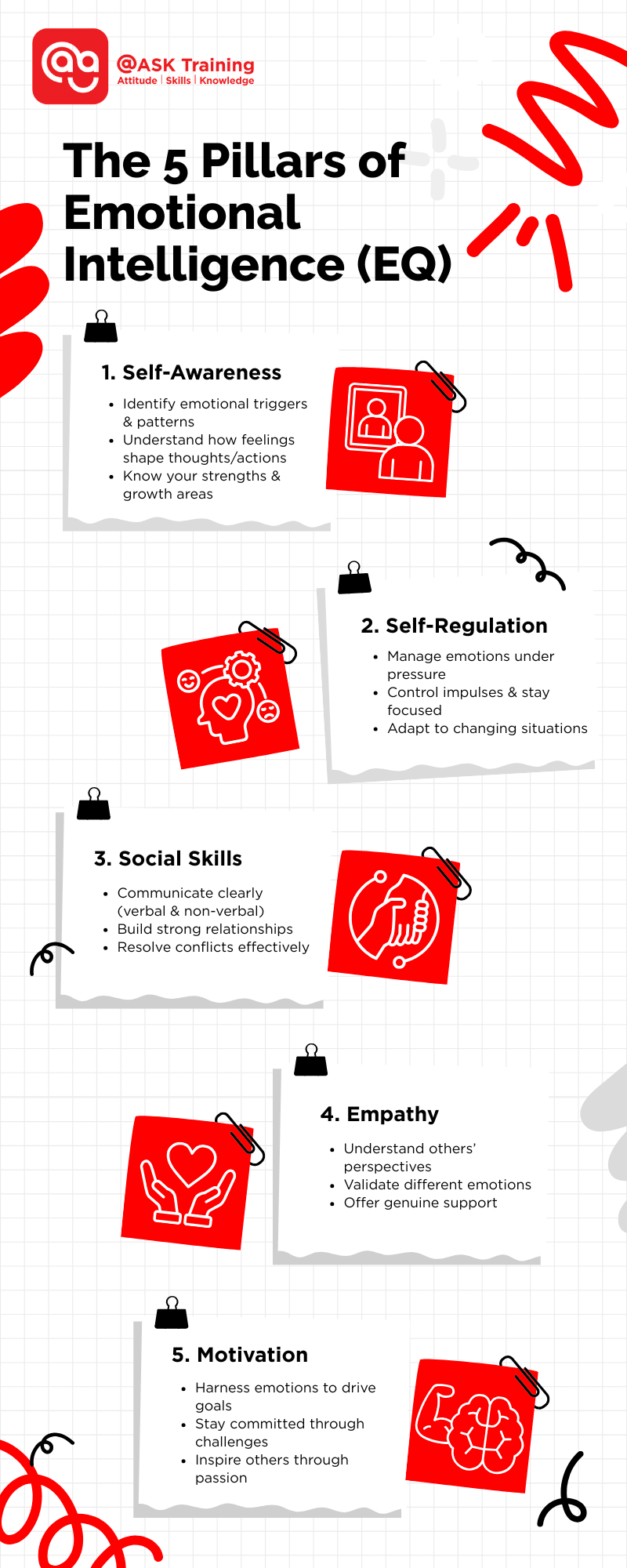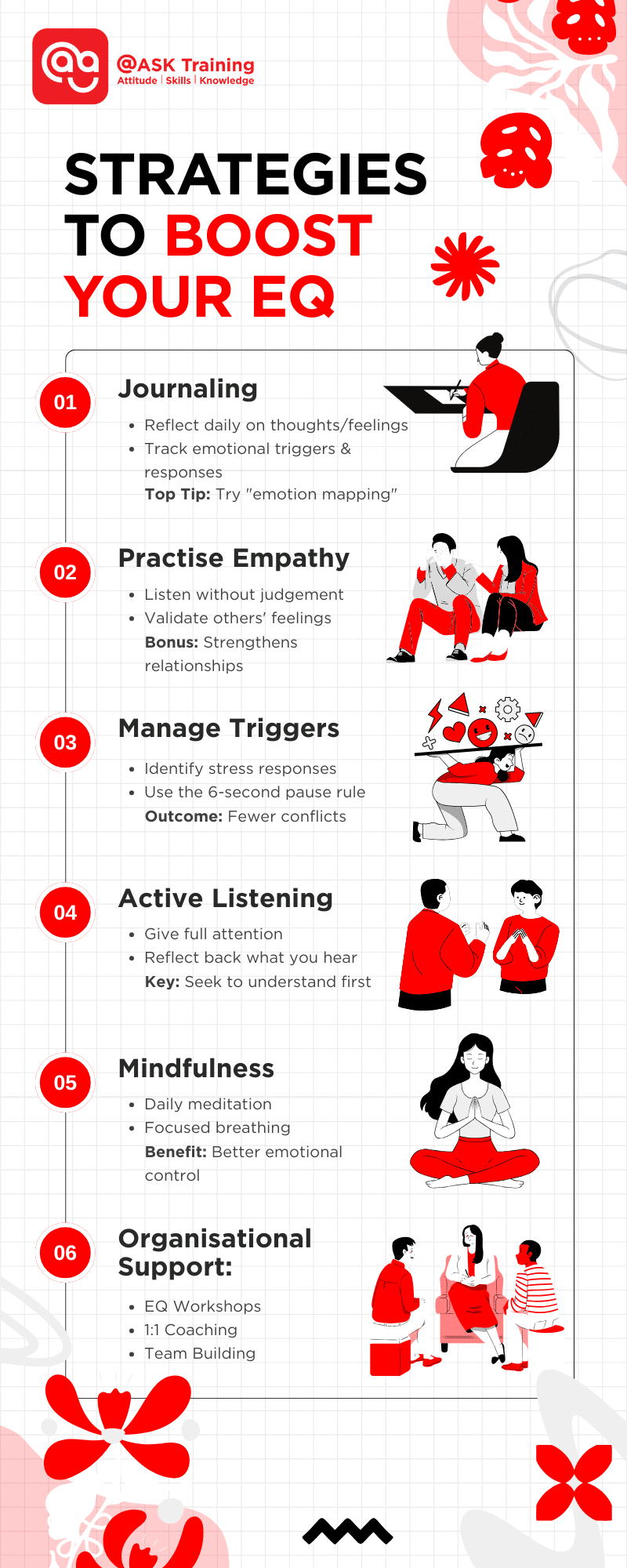
For nearly a century, IQ (Intelligence Quotient) stood as the gold standard for predicting success. However, as workplaces become more collaborative and emotionally complex, a paradigm shift has occurred.
As we adapt to modernisation, it is now revealed that EQ (Emotional Quotient) plays an equally vital, if not greater, role in determining achievement.
In fact, 58% of overall job success is attributed to EQ, and roughly 75% of 500 managers use EQ as a criterion for considering someone for promotion or a salary increase, highlighting its significance across various industries. (Source:
Forbes, 2024)
In this article, you’ll gain further understanding of the definitions and differences between EQ vs IQ while learning how to develop your EQ to complement your IQ.
Understanding EQ and IQ
While both EQ and IQ measure forms of intelligence, they assess entirely different capabilities that impact our lives in unique ways. Let’s break down each concept to understand its distinct roles:
IQ (Intelligence Quotient)
- The ability to measure intellectual abilities and potential, a test of intelligence, which is something that is largely determined by birth
- IQ represents a wide range of cognitive skills, such as reasoning, logic, and problem-solving
- Specific areas commonly associated with are academic performance, the ability to learn new complex information quickly and more.
EQ (Emotional Quotient)
- The ability to understand, use and manage one’s own emotions, as well as recognise and influence the emotions of others
- EQ represents a wide range of skills, such as emotional self-awareness, self-regulation, social awareness and more
- Specific areas commonly associated with are group work, environments where communication is required and more
The critical difference? While IQ is largely fixed, research shows we can significantly improve EQ throughout our lives with conscious effort.
The Five Components of EQ:
1. Self-Awareness
- Recognising your emotional triggers and patterns
- Understanding how emotions affect your thoughts and behaviours
- Having an accurate self-assessment of strengths and weaknesses to work further on oneself positively
2. Self-Regulation
- The ability to manage one’s own behaviours, emotions and thoughts to achieve long-term goals and adapt to situations effectively
- It involves controlling impulses, managing disruptive emotions and staying focused on tasks, even in the face of challenges or distractions
3. Social/Communication Skills
- Encompasses the abilities to effectively send, receive, and process information, including both verbal and non-verbal cues
- These skills are crucial for clear and concise messaging in both personal and professional contexts
4. Empathy
- Both accepting and allowing different perspectives and emotions in other people, and also sharing them with them to enable encouragement and support
5. Motivation
- The driving force behind goal-oriented behaviour, the reason and cause of why people do things
A powerful force that shapes an individual’s actions and helps them to achieve their goals
Both types of intelligence influence behaviour and results differently. A balanced EQ and IQ enable you to make well-informed decisions by blending objective reasoning with consideration of how your choices affect others.
This understanding lays the foundation for exploring how these intelligences manifest in professional settings, which we’ll examine in the next section.
EQ and IQ in Personal and Professional Success
While IQ and EQ both contribute to success, they operate in different domains of our lives. Understanding where each type of intelligence proves most valuable can help you strategically develop both.
IQ proves most valuable in situations requiring:
- Academic environments: Standardised testing, research, and theoretical work.
- Technical professions: Engineering, computer programming, data science.
- Structured problem-solving: Situations with clear right/wrong answers.
IQ alone often fails in ambiguous, people-centric situations where emotions and relationships matter. This is where EQ shines.
Emotional intelligence becomes critical in:
- Team collaboration: Working effectively with diverse personalities.
- Leadership roles: Inspiring and motivating others.
- Client-facing positions: Building trust and support.
As we progress in our careers, EQ often becomes more valuable than IQ for continued advancement.
An example of how EQ compensates for IQ:
In technical roles like IT support, we often overemphasise IQ but consider how EQ transforms competence into excellence.
An IT Support Technician with strong technical skills (IQ) faces:
- Frustrated employees during system outages
- Colleagues struggling with new software
- Pressure to resolve issues quickly
EQ in Action:
1. Customer Service:
- Calms anxious users by acknowledging their stress
- Avoids technical jargon when explaining solutions
2. Emotional Regulation:
- Stays patient when the same issue is reported multiple times
- Maintains composure during critical system failures
3. Team Collaboration:
- Document solutions clearly for colleagues
- Shares credit when resolving complex tickets
Key Takeaway: This leads to lower workplace frustration, fosters trust throughout the organisation, and creates opportunities for promotion. While IQ opens doors, EQ supports long-term success, especially in roles centred on people.
This interplay between cognitive and emotional intelligence becomes even more pronounced when we examine leadership and organisational success. Let’s explore more in the next section.
Importance of EQ in Leadership and Workplace Dynamics
In today’s collaborative work environments, EQ is often the differentiator between a good leader and a great one. A leader with high EQ excels in several crucial areas, such as having effective leadership, communication and conflict resolution.
When there are any misalignments or personal preferences, a team leader should actively listen and validate concerns to ensure that everyone has an equal opportunity to be heard.
For example, an employee who does not like the limelight and is unlikely to speak up during a conference call, an emotionally intelligent leader will consider scheduling a one-on-one meeting to seek their input and help them feel heard.
Additionally, managers with higher EQ are able to foster engagement and trust, leading to stronger team performance and reduced turnover.
Employees feel appreciated when they are listened to, which promotes a sense of support and team spirit. This encourages them to share new ideas and handle problems more effectively (SNHU, 2023).
Why EQ Matters More So Today:
In our hybrid work era, where digital communication dominates, emotional intelligence:
- Bridges the gap created by a lack of face-to-face interaction
- Helps interpret tone in written communication
- Maintains human connection across screens
Now that we’ve seen the importance of EQ in leadership, let’s explore practical ways to strengthen these crucial skills.
Developing and Enhancing Emotional Intelligence
Unlike IQ, which is often perceived as fixed, you can develop and enhance your EQ over time through consistent effort.
Strategies for developing and enhancing EQ:
1. Journaling
- Journaling allows for reflection and helps you become more self-aware of your thoughts and feelings.
- Creates a safe space to process emotions and identify patterns in your reactions.
- Bonus tip: Try “emotion mapping” by noting what triggered strong feelings and how you responded.
2. Practice Empathy
- Listen to others without judgment or interruption.
- Make a conscious effort to understand different perspectives.
- Validate others’ emotions by acknowledging their feelings.
- Added benefit: This builds stronger personal and professional relationships.
3. Understand Emotional Triggers
- Identify situations that provoke strong emotional responses.
- Learn to recognise your physical reactions to stress (increased heart rate, tension).
- Develop pause techniques like deep breathing before responding.
- Key outcome: More thoughtful reactions and reduced conflict.
4. Active Listening
- Give your full attention when others are speaking.
- Use verbal and non-verbal cues to show you’re engaged.
- Reflect on what you’ve heard to ensure understanding.
- Pro tip: Practice “listening to understand” rather than “listening to respond”.
5. Mindfulness Techniques
- Try short daily meditation sessions.
- Practice being fully present in conversations.
- Use breathing exercises to manage stress.
- Benefit: Improves emotional regulation and focus.
All of these methods help promote better emotional regulation. For additional support, consider:
Organisational Methods
- Emotional intelligence workshops
- One-on-one coaching sessions
- Team-building exercises focused on EQ development
- Mindfulness training programmes
Remember: Like any skill, developing emotional intelligence takes regular practice. Start with one strategy and build from there.
Real-World Examples Illustrating EQ and IQ
To better understand the difference between EQ vs IQ, let’s look at a few real-world examples that illustrate their impacts.
1. Conflict Resolution
Situation: A manager facing a heated dispute between two team members uses their EQ to mediate the situation.
Action: Instead of jumping to conclusions and rushing to resolve the issue logically, the manager:
- Listens actively to both sides.
- Acknowledges the emotions involved.
- Helps the team find a common ground.
Results: This approach not only resolves the conflict but also strengthens the relationship between the team.
2. Client Rapport
Situation: A frustrated client threatens to cancel a contract during the negotiation process.
Action: A salesperson with high EQ fosters strong relationships with clients by:
- Tuning into emotional needs.
- Recognising the client’s frustrations.
- Taking the time to validate any concerns.
Results: This approach fosters trust and demonstrates that the salesperson cares for their client’s success and emotions.
3. High IQ without EQ
Situation: A brilliant engineer who can develop cutting-edge technology but has difficulty collaborating with colleagues.
Action (Lacking EQ): Their inability to understand team dynamics can:
- Dismiss colleagues’ ideas in meetings.
- Fail to recognise team members’ nonverbal discomfort.
- Take sole credit for collaborative work.
Results: Despite groundbreaking technical contributions, the engineer’s inability to collaborate stalls their career growth. Team morale and productivity suffer as colleagues disengage from joint projects.
These real-world scenarios demonstrate that while raw intellectual ability (IQ) opens doors, it’s emotional intelligence (EQ) that determines how we walk through them—and who chooses to walk with us.
Wrapping Up
In our increasingly interconnected world, technical skills alone are no longer enough; the ability to navigate emotions (yours and others’) has become the true differentiator of success.
EQ enables one to navigate complex interpersonal situations, adapt to changing environments, and lead with empathy.
Actions You Can Try Today:
- Assess: Identify one EQ area for immediate focus.
- Practice: Implement one strategy daily.
- Reflect: Journal about what’s working.
- Expand: Gradually add new EQ skills.
Mastering the above strategies may be challenging, but it is certainly possible for you to improve your EQ as long as you take the first step and put your heart into it!
Need Support?
For more information on strengthening your EQ as part of your overall self-improvement journey, @ASK Training will be your suitable ally in this journey!
Explore our range of Leadership and Management courses, such as Enhancing Your Emotional Intelligence, designed to help you manage your emotions, as well as others.
Don’t let fear hold you back. Start your journey to becoming more emotionally intelligent and apply the skills learnt to your work and life!


